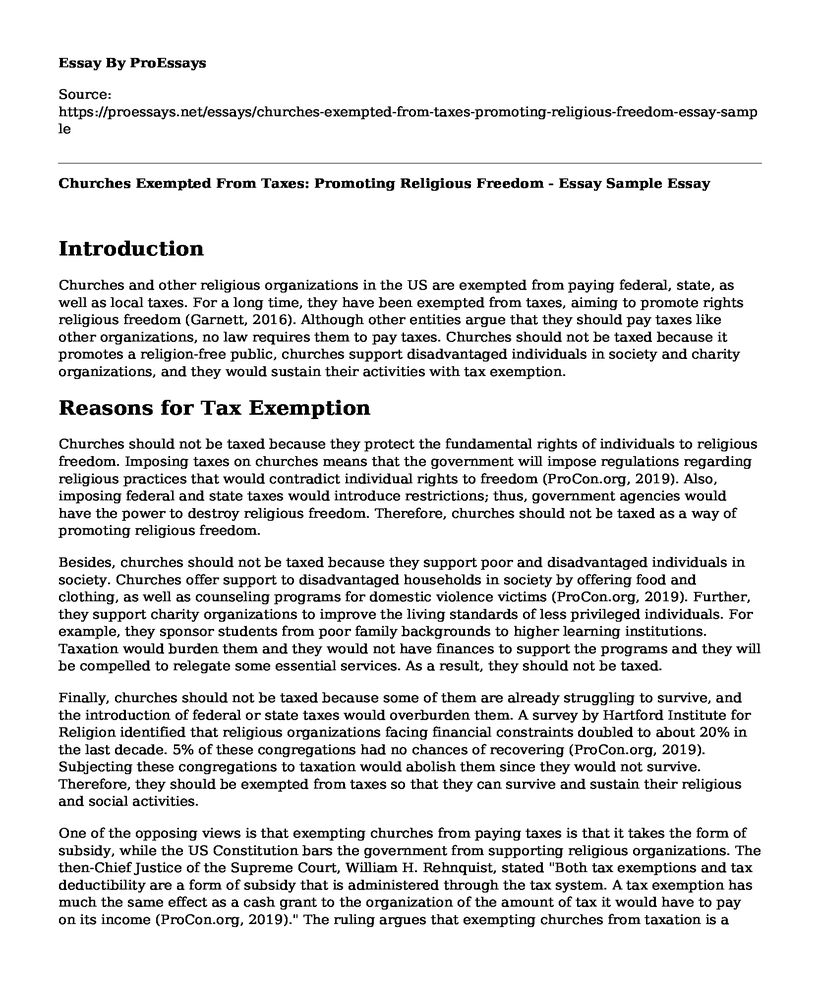Introduction
Churches and other religious organizations in the US are exempted from paying federal, state, as well as local taxes. For a long time, they have been exempted from taxes, aiming to promote rights religious freedom (Garnett, 2016). Although other entities argue that they should pay taxes like other organizations, no law requires them to pay taxes. Churches should not be taxed because it promotes a religion-free public, churches support disadvantaged individuals in society and charity organizations, and they would sustain their activities with tax exemption.
Reasons for Tax Exemption
Churches should not be taxed because they protect the fundamental rights of individuals to religious freedom. Imposing taxes on churches means that the government will impose regulations regarding religious practices that would contradict individual rights to freedom (ProCon.org, 2019). Also, imposing federal and state taxes would introduce restrictions; thus, government agencies would have the power to destroy religious freedom. Therefore, churches should not be taxed as a way of promoting religious freedom.
Besides, churches should not be taxed because they support poor and disadvantaged individuals in society. Churches offer support to disadvantaged households in society by offering food and clothing, as well as counseling programs for domestic violence victims (ProCon.org, 2019). Further, they support charity organizations to improve the living standards of less privileged individuals. For example, they sponsor students from poor family backgrounds to higher learning institutions. Taxation would burden them and they would not have finances to support the programs and they will be compelled to relegate some essential services. As a result, they should not be taxed.
Finally, churches should not be taxed because some of them are already struggling to survive, and the introduction of federal or state taxes would overburden them. A survey by Hartford Institute for Religion identified that religious organizations facing financial constraints doubled to about 20% in the last decade. 5% of these congregations had no chances of recovering (ProCon.org, 2019). Subjecting these congregations to taxation would abolish them since they would not survive. Therefore, they should be exempted from taxes so that they can survive and sustain their religious and social activities.
One of the opposing views is that exempting churches from paying taxes is that it takes the form of subsidy, while the US Constitution bars the government from supporting religious organizations. The then-Chief Justice of the Supreme Court, William H. Rehnquist, stated "Both tax exemptions and tax deductibility are a form of subsidy that is administered through the tax system. A tax exemption has much the same effect as a cash grant to the organization of the amount of tax it would have to pay on its income (ProCon.org, 2019)." The ruling argues that exempting churches from taxation is a form of subsidizing religious organizations and this promotes bias. Therefore, churches should not be taxed and be treated like other organizations according to the law.
Conclusion
Churches should not be taxed because it promotes a religion-free public, churches support disadvantaged individuals in society and charity organizations, and they would sustain their activities with tax exemption. Churches and other religious organizations in the US are not subjected to taxation. The practice has been available for long, and this has helped to promote religious tolerance. However, other scholars argue that churches should not be exempted from taxation since it looks like subsidizing their activities which is against the constitution. The US Constitution bars the government from subsidizing religious organizations and this amount to discrimination.
References
Garnett, R. (2016). Why churches shouldn't have to pay taxes. Retrieved from https://www.uscatholic.org/articles/201610/why-churches-shouldnt-have-pay-taxes-30799
ProCon.org. (2019). Should Churches (Including Mosques, Synagogues, etc.) Remain Tax-Exempt? Retrieved from https://churchesandtaxes.procon.org/
Cite this page
Churches Exempted From Taxes: Promoting Religious Freedom - Essay Sample. (2023, Mar 27). Retrieved from https://proessays.net/essays/churches-exempted-from-taxes-promoting-religious-freedom-essay-sample
If you are the original author of this essay and no longer wish to have it published on the ProEssays website, please click below to request its removal:
- Christian Counselling Essay
- The Concept of Culture - Paper Example
- The Mobile Phone Bible Is Now Replacing the Book Bible Paper Example
- Current News Story That Relates to the Old Testament - Essay Sample
- Essay Example on ISIS: Rising to Power & Impact on Islamic Religion
- Essay Sample on Breaking Barriers: Religion Working to Create Inclusion for the Disabled
- Christianity and Abortion: A Complicated History - Essay Sample







